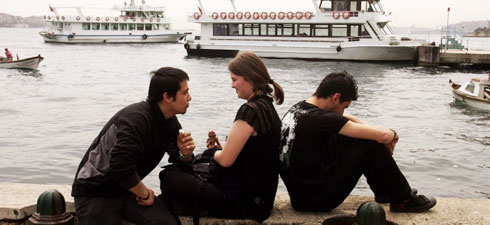Once a month, about 50 of them meet in a fashionable bar in downtown Istanbul. It is a time for chat and the swapping business cards and job offers, but everyone is talking German. “German is my mother tongue,” insists Emine Sahin, the 37-year-old real-estate project manager, who organises the monthly meet of German-Turks who, like her, have chosen to come and live on the banks of the Bosphorus.
“The trend created by young Germans who pull up stakes and return to the old country is now a growing phenomenon. With the economic crisis in Europe, there aren’t enough job opportunities for young graduates with an international profile,” explains the young woman with large pale-coloured eyes. In contrast, Turkey with its Chinese style growth rates and dynamic society “offers much better prospects,” insists Emine, who was born in Ankara, but brought up in Germany where had parents emigrated. She defines herself as “a model of social integration.”
Fifty years after the arrival of the first Gastarbeiter (guest workers) in 1961, the migratory flow between Turkey and Germany has changed course. More than three million Turks live in Germany. But in 2009, the number returning to Istanbul (40,000) now outweighs the number of new arrivals (approximately 30,000). The children and grandchildren of Anatolian immigrants are now traveling back. A phenomenon which goes against fantastic theories of an invasion of Turkish workers in the event of Turkish accession to the European Union.
"I always dreamed of living in Istanbul"
According to a survey by the German Futureorg institute, one third of dual nationality students in Germany are thinking about a career in Turkey. Companies on the other side of the Rhine have understood how to take advantage of this phenomenon. The Turkish subsidiary of Mercedes-Benz now reseves 30% of its management positions for German-Turks. Government institutions, hoping to benefit from their dual culture, are also opening their doors to Euro-Turks. “Turkey is developing very quickly and needs people like us,” remarks Belgian born and educated Ilker Astarci, who was recently appointed as an advisor to Prime Minister Recep Tayyip Erdogan. “There are more opportunities than there are in Europe. I felt it was important to do something for Turkey, which is my country of origin.”
Large numbers of Europeans of Turkish origin from Belgium, the Netherlands, Austria and France are answering the siren call of the city on the Bosphorus. “I am receiving more and more CVs from young French-Turks, especially young women,” says Hatice Luis, who runs the local office of a French logistics company. For some Turks, Istanbul offers a convenient means of escaping from familial pressure. The third eldest in a family of six girls, Hatice, age 32, grew up in Clichy-sous-Bois (Seine-Saint-Denis). “We lived in a three-room flat on the 10th floor, where my parents had set up a sewing workshop in the children’s bedroom,” she says. “My father, who comes from a small village, didn’t want his daughters to study. But I was saved by my secondary school teachers, who showed remarkable commitment when they insisted on my behalf.” In 2001, she finally arrived in Istanbul, “the only destination our parents are not opposed to,” remarks another “repatriate.”
Second and third generation European-Turks are often inspired by dreams of returning to their roots. “I always dreamed of living in Istanbul,” says Pinar Kiliç, who moved from Frankfurt in 2006, and now works for the Turkish subsidiary of Google. “I feel Turkish, even though I lived for 25 years in Germany. At home we spoke Turkish, and we ate Turkish food.”
“It comes as a real shock"
A quest for identity was also a motive for Hatice, who was “frustrated because she was not considered to be Turkish in Turkey, or French in France.” Now she has found a compromise in Istanbul “which is European with an Oriental quality, just like us,” she says. “But there is no doubt that I am French, even though I have only just obtained my nationality. That is something that I found out since I came to Turkey.” Emine, who defines herself as “German with Turkish roots” tells a similar story. “At age 14, I really didn’t know which culture I belonged to,” she explains.
For Ali Koç, who arrived from a small village in the Vosges in 2004, the goal was to improve his command of the language and to discover his parents home country. “Like many other French-Turks, I only knew the small village in Anatolia where I spent two months every summer,” he explains. “As for me personally, I feel that I am more French, but culturally I am more Turkish. At the same time, I’m very attached to the society where I was brought up: the acceptance of social diversity, and access to funding for education were very important to someone whose father only earned the minimum wage. There is nothing like it here.”
Migration to Turkey is a growing trend among highly qualified under-35s who find better opportunities than they would in Europe. They are sensitive to the issue of discrimination in European society and political debates on the question of social integration. “But I do not believe that negative experience or a lack of integration is the main reason for their desire to live in Turkey,” points out American academic Susan Rottmann, who has studied the phenomenon. And for the children of Anatolian emigrant families, the discovery of Istanbul “comes as a real shock,” remarks Ali Koç. Traveling to Turkey just like traveling to Europe also requires a sudden adjustment to cultural difference.
Was this article useful? If so we are delighted!
It is freely available because we believe that the right to free and independent information is essential for democracy. But this right is not guaranteed forever, and independence comes at a cost. We need your support in order to continue publishing independent, multilingual news for all Europeans.
Discover our subscription offers and their exclusive benefits and become a member of our community now!












